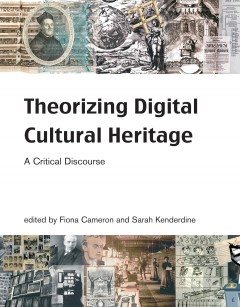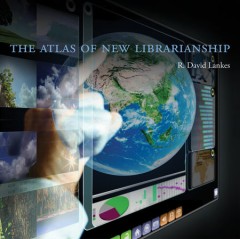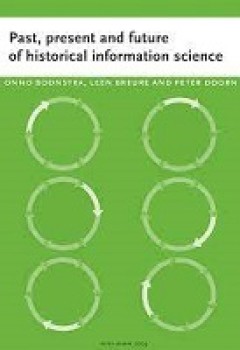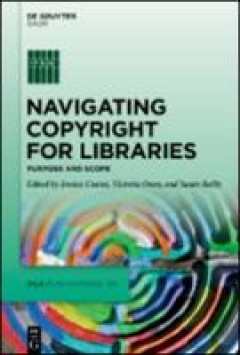Filter by

Theorizing Digital Cultural Heritage: A Critical Discourse
This is a collection of theoretical and practical perspectives from a range of disciplines on the challenges of using digital media in research, preservation, management, interpretation, and representation of cultural heritage.OCLC-licensed vendor bibliographic record.
- Edition
- -
- ISBN/ISSN
- 9780262269742
- Collation
- 1 online resource (x, 465 pages) :illustrations.
- Series Title
- -
- Call Number
- -

A History of British Fossil Mammals, and Birds
Richard Owen (1804–92) was a controversial and influential palaeontologist and anatomist. During his medical studies in Edinburgh and London, he grew interested in anatomical research and, after qualifying as a surgeon, became assistant conservator in the museum of the Royal College of Surgeons, and then superintendent of natural history in the British Museum. He became an authority on compar…
- Edition
- -
- ISBN/ISSN
- -
- Collation
- -
- Series Title
- -
- Call Number
- -

The Atlas of New Librarianship
An essential guide to a librarianship based not on books and artifacts but on knowledge and learning. Libraries have existed for millennia, but today the library field is searching for solid footing in an increasingly fragmented (and increasingly digital) information environment. What is librarianship when it is unmoored from cataloging, books, buildings, and committees? In The Atlas of New Li…
- Edition
- -
- ISBN/ISSN
- 9780262300087
- Collation
- -
- Series Title
- -
- Call Number
- -

Knowledge justice :disrupting library and information studies through critica…
"Contributors analyze and re-envision the field and profession of library and information science from the perspective of critical race theory"--OCLC-licensed vendor bibliographic record.
- Edition
- -
- ISBN/ISSN
- 0262363208
- Collation
- 1 online resource.
- Series Title
- -
- Call Number
- -

The Atlas of New Librarianship
Includes 1 folded chart in pocket inside back cover.Some online versions lack accompanying media packaged with the printed version."Libraries have existed for millennia, but today the library field is searching for solid footing in an increasingly fragmented (and increasingly digital) information environment. What is librarianship when it is unmoored from cataloging, books, buildings, and commi…
- Edition
- -
- ISBN/ISSN
- 0262300087
- Collation
- 1 online resource (xv, 408 pages) :illustrations (some color), color maps
- Series Title
- -
- Call Number
- -

Past, present and future of historical information science
This book evaluates the results of two decades of research in ‘history and computing’. In spite of the fact that a lot has been accomplished, the report indicates critical places for improvement. Many historians and other humanities scholars seem satisfied with standard office tools, which do not always suit their complex sources and research questions. While more and more archival sources …
- Edition
- Ed. 1
- ISBN/ISSN
- 9069844133
- Collation
- 132
- Series Title
- -
- Call Number
- 021 BOO p

Information and Intrigue : From Index Cards to Dewey Decimals to Alger Hiss
An account of Herbert Field's quest for a new way of organizing information and how information systems are produced by ideology as well as technology. In Information and Intrigue Colin Burke tells the story of one man's plan to revolutionize the world's science information systems and how science itself became enmeshed with ideology and the institutions of modern liberalism. In the 1890s, t…
- Edition
- -
- ISBN/ISSN
- 9780262323352
- Collation
- -
- Series Title
- -
- Call Number
- 020 BUR i

Navigating Copyright for Libraries: Purpose and Scope
Much of the information that libraries make available is protected by copyright or subject to the terms of license agreements. This reader presents an overview of current issues in copyright law reform. The chapters present salient points, overviews of the law and legal concepts, selected comparisons of approaches around the world, significance of the topic, and opportunities for reform, advoca…
- Edition
- -
- ISBN/ISSN
- 9783110732009
- Collation
- -
- Series Title
- -
- Call Number
- -

Catalogue of books printed before 1801 in the legal historical section of the…
The present catalogue is the second of three volumes which record the books printed before 1801 currently held by the legal historical section of the Biblioteca di Scienze Sociali of the Università degli Studi di Firenze. This volume encompasses 2,424 editions published between 1601 and 1700. The present Florence library is the successor to that of the Facoltà di Giurisprudenza, the nucleus o…
- Edition
- Ed. 1
- ISBN/ISSN
- 9788866555759, 9788866555742
- Collation
- 788
- Series Title
- Fonti storiche e letterarie – Edizioni cartacee e digitali, 40
- Call Number
- 025.1 DOU c

Radical Collections: Re-examining the roots of collections, practices and inf…
Do archivists ‘curate’ history? And to what extent are our librarians the gatekeepers of knowledge? Libraries and archives have a long and rich history of compiling ‘radical collections’- from Klanwatch Project in the States to the R. D. Laing Archive in Glasgow, but a re-examination of the information professions and all aspects of managing those collections is long overdue. This new b…
- Edition
- Ed. 1
- ISBN/ISSN
- 9781913002015, 9781913002008
- Collation
- 90
- Series Title
- -
- Call Number
- 020 RAD r
 Computer Science, Information & General Works
Computer Science, Information & General Works  Philosophy & Psychology
Philosophy & Psychology  Religion
Religion  Social Sciences
Social Sciences  Language
Language  Pure Science
Pure Science  Applied Sciences
Applied Sciences  Art & Recreation
Art & Recreation  Literature
Literature  History & Geography
History & Geography